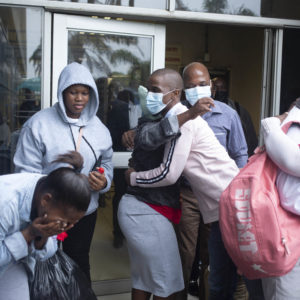Trouble in the promised land
The socialist commune Abahlali baseMjondolo built from the eKhenana land occupation in Durban has won international admiration and solidarity, but it now faces a new wave of repression.
Author:
8 November 2021
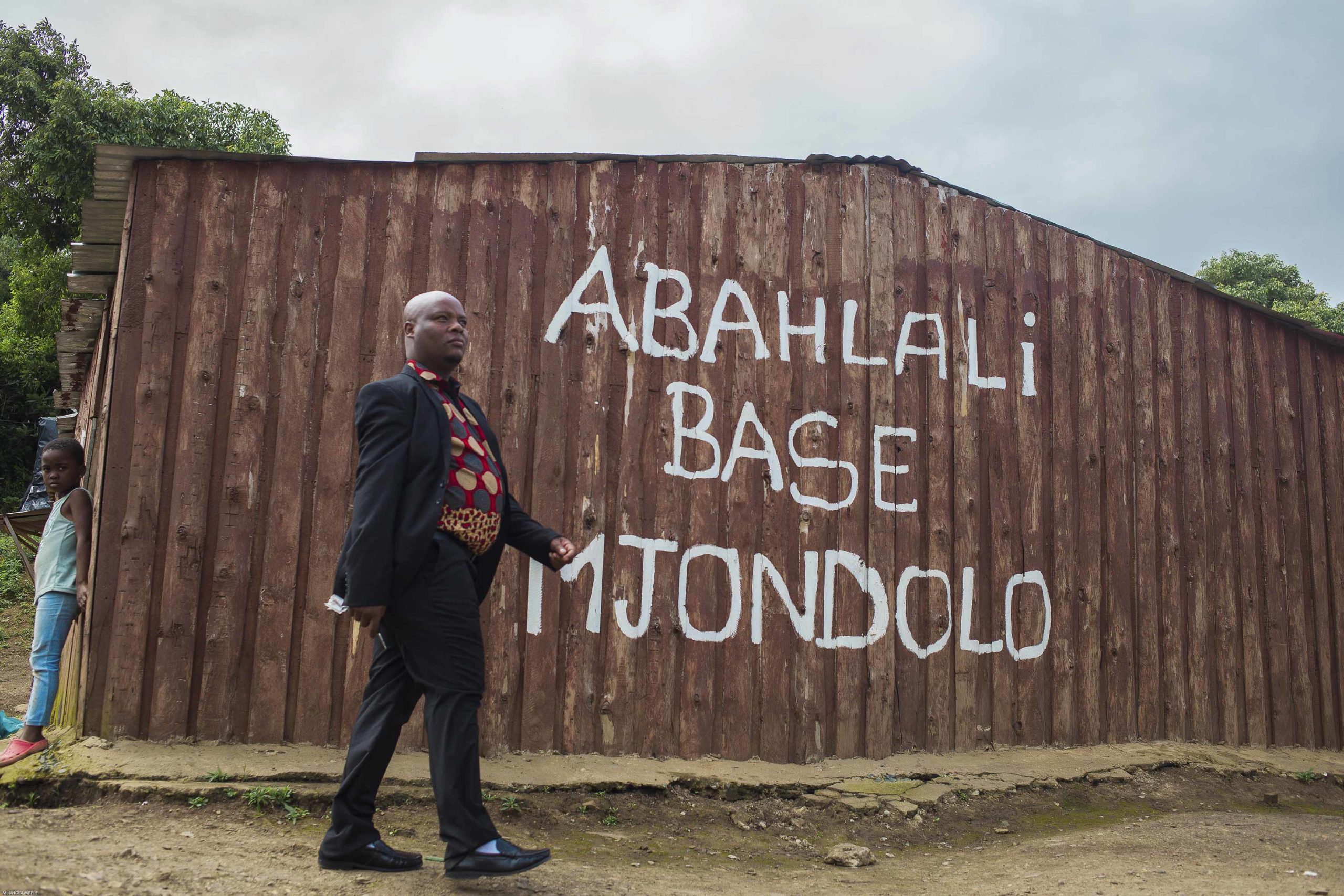
eKhenana is carved into a gentle slope in the sprawling, degraded and violent mix of shacklands and state housing in Cato Manor, a storied site of Black urban life and political resistance for more than a century before its destruction by the apartheid state in the early 1960s.
Here, community affairs are managed through democratic processes, food is collectively produced and distributed, there is a thriving cultural life including poetry and theatre, and a political school named after Frantz Fanon, the renowned radical intellectual. Classes are regularly run for activists from across the city and elsewhere in the country.
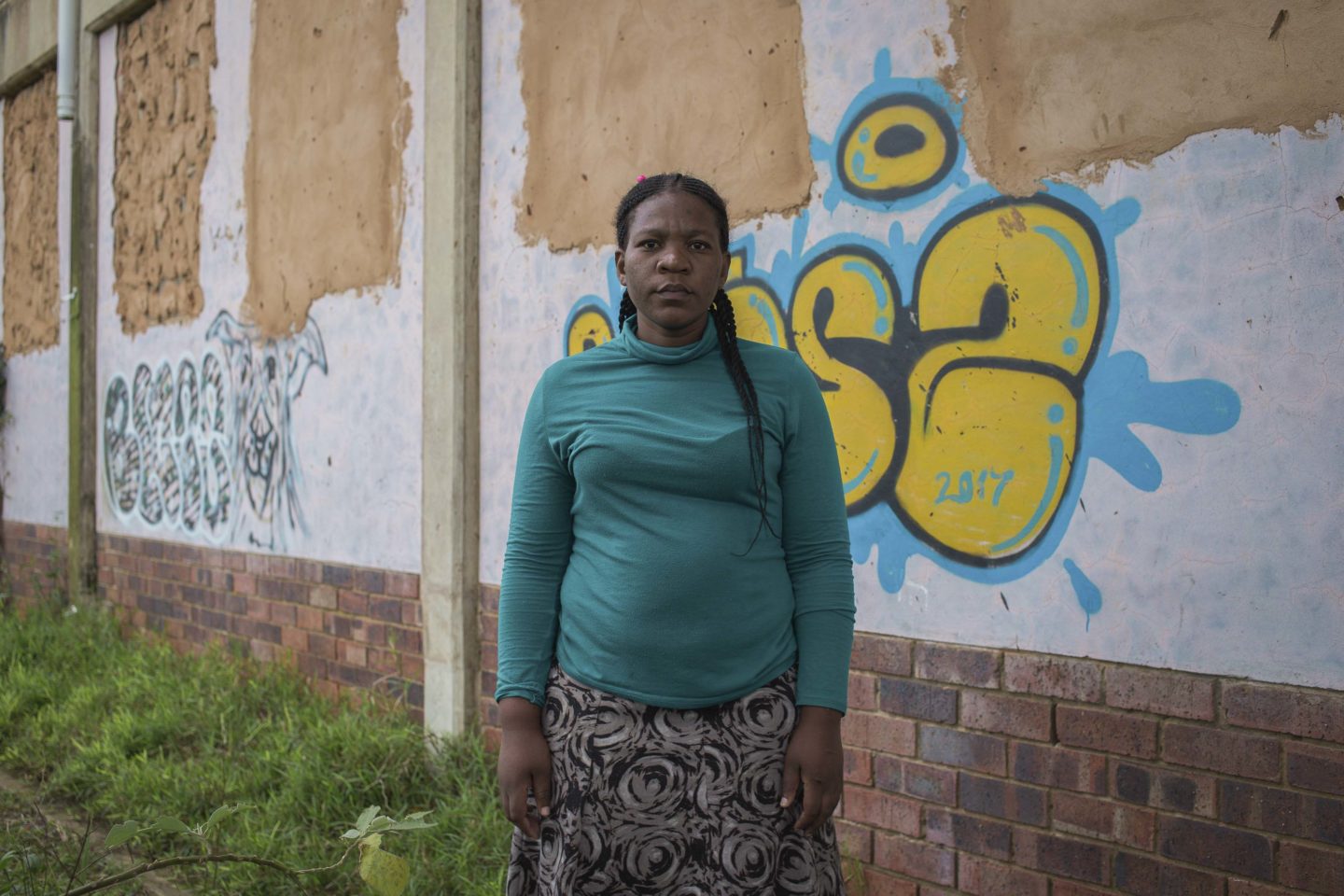
It was founded as a land occupation in 2018 and has faced numerous violent and illegal evictions over the years. On 27 December 2019, the shack dwellers’ movement Abahlali baseMjondolo won an interdict in the high court in Durban, preventing the municipality from continuing with illegal evictions. It was reaffirmed on 24 April 2020, after the municipality continued to evict and destroy the occupation, violating the court order and the government’s Covid-19 lockdown regulations.
Since March this year, residents have also had to contend with the regular arrests of its leaders. Ayanda Ngila, 29, Lindokuhle Mnguni, 27, and Landu Shazi, 33, were arrested and charged with murder in March. They were repeatedly denied bail and held in the grim confines of Westville Prison, which is notorious for its poor conditions, corruption and violence.
In May, Maphiwe Gasela, 29, Siniko Miya, 29, and the deputy president of Abahlali baseMjondolo, Mqapheli Bonono, 39, were arrested and charged with conspiracy to murder. They were sent to Westville Prison for two weeks, after which Bonono and Gasela were granted bail with stringent conditions that prevented them from returning to eKhenana.
‘Bogus’ charges
By this time, the arrests had attracted significant international attention. Progressive organisations across Africa and elsewhere, including the Landless Workers Movement in Brazil, released statements of solidarity.
Abahlali baseMjondolo described the charges on which all six activists were arrested as “bogus”. It insisted that the local ANC and the state were misusing the criminal justice system in an attempt to crush the occupation.
Ngila, Mnguni and Shazi spent six months in prison before the charges against them were withdrawn on 29 September. All charges were withdrawn against Gasela, Miya and Bonono on 4 October.
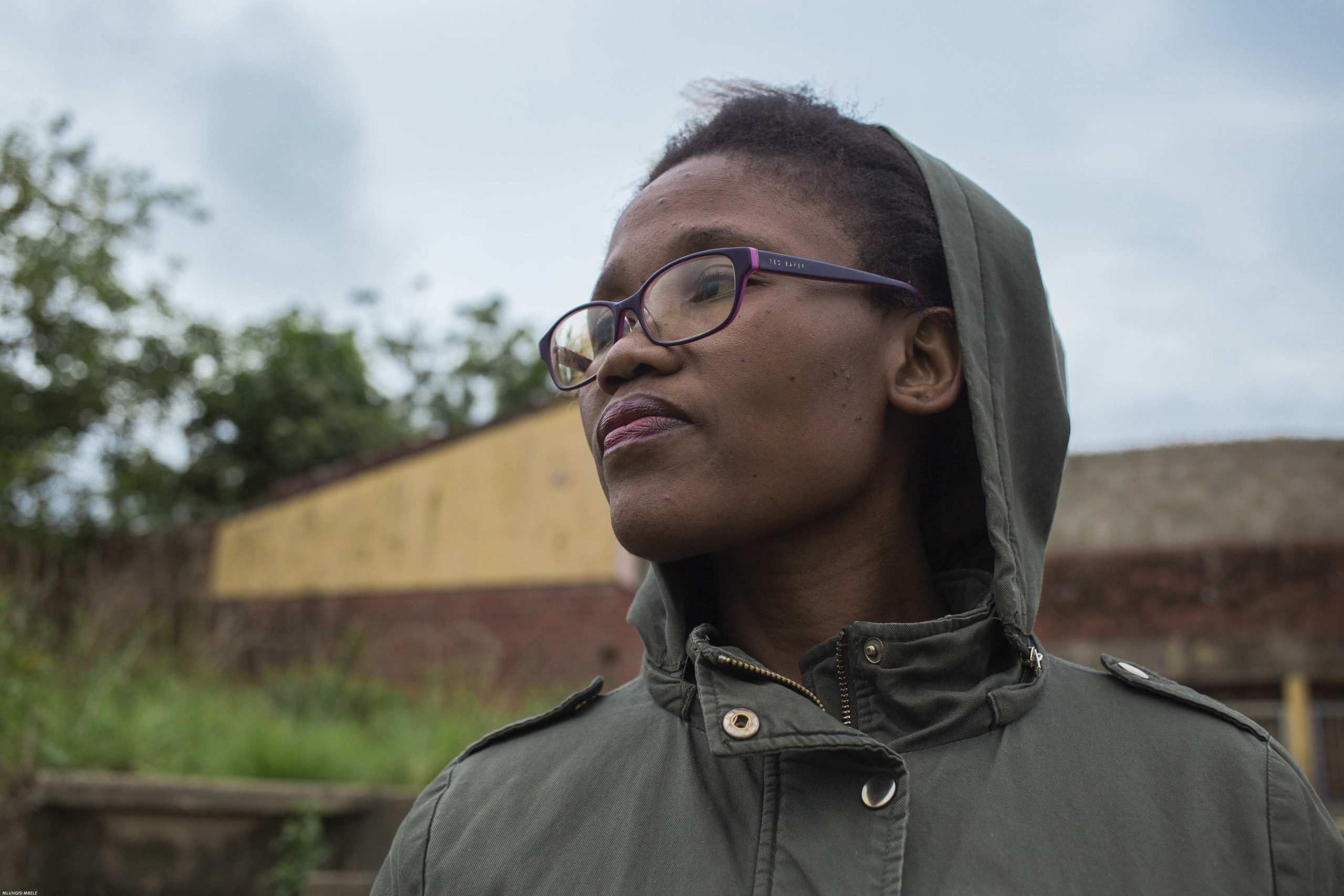
Four days later, on 8 October, Nokuthula Mabaso, 39, Thozama Mazwi, 33, and Sindiswa Ngcobo, 26, were arrested in eKhenana. The three women were charged with assault with intent to cause grievous bodily harm in relation to an incident that Abahlali baseMjondolo said was an intervention against a violent attack on a migrant in April last year. The three were released on bail on 21 October, with conditions that prohibit them from returning to eKhenana after spending just less than two weeks in prison.
Two days later, Phumelele Mkhize, 30, and Gasela were arrested and subjected to the same charges as the other three women. Abahlali baseMjondolo issued a statement claiming that shortly before the arrests, “ANC thugs molested and assaulted” four women at the occupation, including Mkhize. On 25 October, Gasela and Mkhize were each granted R500 bail. The bail conditions stipulated that they should not go anywhere near eKhenana. The following night, their homes were burnt to the ground. Abahlali baseMjondolo claimed that this followed a meeting of local ANC members.
Feeling abused
Gasela said she feels “repeatedly abused and defeated” by the state. Describing her recent arrest and the loss of her home after being released on bail, she broke down.
“[Sometimes] I feel they [the police and the ANC local leaders] have defeated me … I have no fight left. Once again, I have been reduced to a criminal even though I have committed no crime. My dignity has been tarnished. My home, which I worked hard to build, has been burnt to ashes. When the police came for us and took us into the van on Saturday [23 October], I couldn’t believe it was happening again.”
She said that inside the holding cells, she felt she was completely “losing it”. “I couldn’t stop thinking about my children and wondering what happened to the rest of the residents who had also been assaulted and arrested.
“During the arrest, I demanded that the police lock me up with my youngest child,” said Gasela. Her daughter is 21 months old. “But the conditions in the holding cells were appalling, my child could not cope. We had no choice but to let her go back home without her mother again. The pain of seeing your child being taken away while in jail was heartbreaking.”
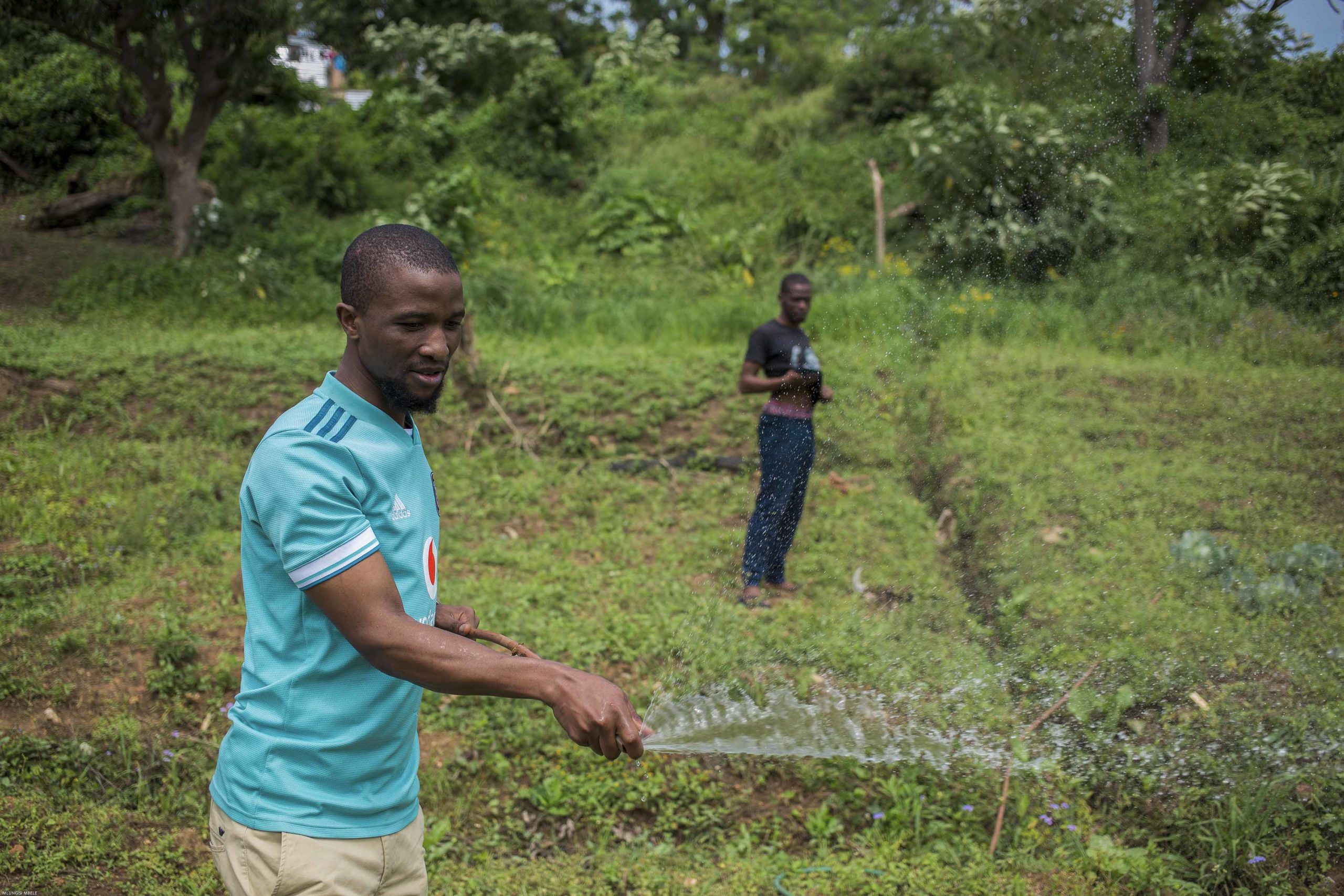
The morning after losing their homes to fire, Mkhize and Gasela tried to open arson cases at the Cato Manor police station, known as KwaKito, but the police sent them away. They were able to open cases later on when their lawyer, Mbalenhle Kubheka, accompanied them to the station, but said the police have not yet investigated.
“I am unemployed. I was able to gradually start buying furniture for my home. It took me years to gather all the belongings that were in that house. Now there is nothing left. It seems like the police are only happy to investigate and make arrests in cases against us,” said Mkhize tearfully.
Mkhize is living with a family member nearby. Her children remained in eKhenana when they were arrested. She said one of her children saw one of the alleged arsonists – a person well known to the community – break down their shack door. A while later, the shack was on fire.
“I have had enough,” said Mkhize. “I have been arrested for something I did not do. I don’t have a home any more, and all my belongings and my children’s ID documents have been destroyed.”
Attacks on women’s rights
Zanele Mtshali, chairperson of the Abahlali baseMjondolo Women’s League, said the recent arrests, alleged attacks and arson are not only attacks on women’s rights but also purely criminal acts.
“What happened to these women is a clear indication of how the state continues to deny poor Black women equal rights to justice. Some of the women who were arrested have young children and were arrested and attacked in front of them. We can see what they are trying to do to the eKhenana settlement. They want to dismantle it in its entirety using all possible plots,” she said.
“The social impact of these attacks affects women and children [more], thus weakening the social and family fabric in the settlements. Particularly, in eKhenana, it is the women who spearheaded the food gardens, shops and poultry. And by attacking the women leading these projects, the ANC thugs’ purpose is to collapse the settlement and its residents. We refuse to be shaken and intimidated, and we will continue to fight for our women until they are free,” said Mtshali.
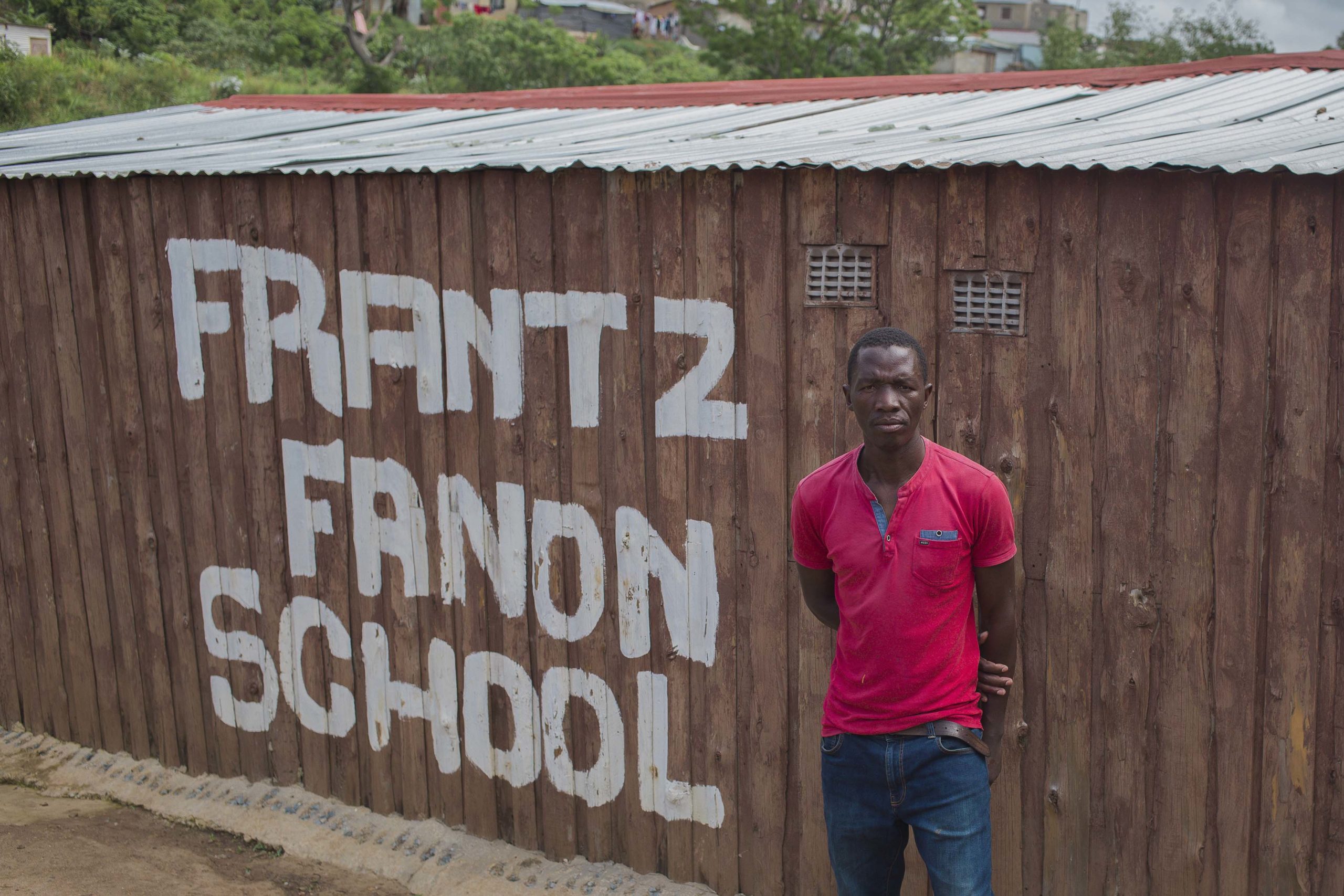
eKhenana resident Sabelo Simelane, 36, said the community no longer feel safe after the arrests and the gutting of the two women’s homes.
“The police from KwaKito, alongside the municipality [security officers], have continuously treated this settlement with violence. When eKhenana residents open criminal cases at the police station, there are no investigations. If there are charges against members of the movement, the police are quick to make arrests without any investigations,” Simelane said.
Abahlali baseMjondolo spokesperson Thapelo Mohapi said local leaders in the ruling party, the eThekwini municipality and the police have accused the movement of trying to create its own authority, a kind of state within a state, where a community is able to thrive by doings things for itself without relying on the state or state organs.
“We are called the ‘enemy of the state’ because we have created a system where this community is self-reliant. They know that there are no job opportunities in this country, but when young people are trying to occupy themselves by doing something good for their communities, they are harassed, they are arrested and even killed,” Mohapi said.
‘Jail was horrific’
Bonono said: “When the charges were withdrawn, I was happy because I could visit this area again. When eKhenana was established, I was the provincial leader of the Abahlali movement, so I was at the forefront. I used to attend the Frantz Fanon school, where I learnt so many things from the comrades and I also taught them about the experiences I learnt from visiting other communes in Brazil, Ghana and other countries.”
Miya said he still doesn’t feel free. “My time in jail was horrific. I still even have nightmares where I wake up in the middle of the night thinking that I am still in jail. My family members are trying to make me feel at home, but it is not easy. The jail is a dangerous place. You could be arrested for trumped-up charges and go to jail. There, prisoners could kill you by stabbing you in an initiation ritual just so that they could be accepted as gang members.”
Ngila said he has not been able to go back to living in eKhenana. “Initially, I thought the police would quickly realise their mistake in arresting us and release us. But we had to spend six months in jail for a murder we didn’t commit. I think the state must take action [against] the people who brought false evidence against us.”
Mnguni said his experience of jail was traumatic. He was nearly forced to pay thousands of rands to those who run protection rackets in cells just so he would be left alone and not attacked. “But I was lucky because there was a comrade who was feared and he was sympathetic to the Abahlali cause. He took me under his wing and protected me.”
Related article:
Shazi said he was arrested by a plain-clothes police officer who assaulted him, accusing him of resisting arrest. “That officer doesn’t even work at Cato Manor police station and he was abusing the law. He is the one who was doing most of the assault. I spent weeks in hospital, both my hands and feet shackled. All this for a crime I didn’t commit.”
All the former accused have consulted their lawyers as an initial step towards bringing a suit against the minister of police, the National Prosecuting Authority and other state organs for wrongful arrest and malicious prosecution. They also intend to take this matter to the Independent Police Investigative Directorate over the conduct of the police officers who arrested them.
On 13 October, retired Anglican bishop and former leader in the Black Consciousness Movement Rubin Phillip said: “I add my voice to those respectfully calling for advocate Shamila Batohi, the director of the National Prosecuting Authority, to mount a swift and effective investigation into the sustained misuse of the criminal justice system to repress grassroots activists in Durban.”

